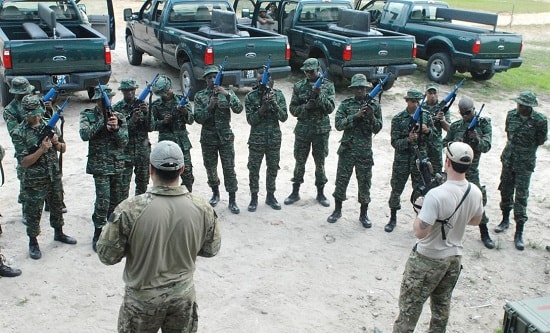
Guyana is mired in a swirling political crisis. Weeks have passed since the 2 March elections with no winner declared. Amidst accusations of vote rigging, corruption, and the funding of US lobbying firms, US oil giant ExxonMobil has begun producing oil in the Essequibo region – territory long under dispute with neighbouring Venezuela. Seizing the opportunity to grab oil and threaten the Bolivarian revolution in Venezuela, the US has designated Guyana as a country of strategic importance, stationing troops and ramping up military co-operation. Guyana is fast becoming the new front of the war against socialism in Latin America.
The Essequibo dispute is rooted in the bloodstained legacy of British colonialism. In 1811 Venezuela became one of the first Spanish American colonies to declare independence and its recognised territory included the region west of the Essequibo river. Venezuela’s borders immediately came under threat from Britain, which controlled what was then British Guiana. In 1835 Explorer Robert Schomburgk was commissioned by the British government to conduct a survey of British Guiana’s geographical boundaries. He identified the Essequibo and the Orinoco river basins as geopolitical strongholds from which to advance deeper into the continent, drawing the infamous Schomburgk line claiming the Orinoco river mouth for the British empire. In 1886, in true colonial fashion, a map was drawn up in London, demarcating borders with scant regard for the region’s inhabitants.
Guyana finally won independence from Britain in 1966 and a framework was agreed by Britain, Guyana and Venezuela for resolving the dispute. Whilst a solution was never reached, the treaty states that activities taking place on the disputed territories ‘shall constitute a basis for asserting, supporting or denying a claim to territorial sovereignty’ and prohibits both nations from advancing the issue except through official international mechanisms and the UN Charter.
Flouting this, in 2015 the Guyanese government of David Granger accepted a $200m deal from ExxonMobil to drill in Essequibo, beginning extraction in 2019 with production expected to reach 120,000 bpd in the coming months. $200m is peanuts for ExxonMobil, whose massive discovery exceeds 8 billion barrels of light shale oil, worth over $300bn. For a country with a population of 750,000 where 36% live in poverty this could mean a record 85% growth in GDP. However, ExxonMobil have scored ‘the deal of the century’, forcing unfavourable terms on Guyana; a two percent royalty and a 50 percent profit share after the oil company recuperates costs. Open Oil financial analysts argue the deal falls short of international norms (10% royalty, corporate income tax 25%) and will see Guyana lose over $1.3 billion a year for forty years. Unsurprisingly, ExxonMobil have agreed to cover costs in Guyana’s legal battle with Venezuela and the World Bank funded the companies legal team to rewrite Guyana’s oil laws. They have never forgiven Venezuela for hydrocarbon nationalisations of 2007 which demanded a minimum of 51% state ownership. ExxonMobil refused to cooperate, demanding $18bn in compensation but only winning $1.6bn.
Guyana is now a strategic priority for the US. In 2019, SOUTHCOM’s Major General Andrew Croft remarked ‘Guyana is going to become a larger player in this region, both economically and politically in the future, so it’s important that we (the US) are closely tied with them’. The US has deployed 600 military personnel in the border region under the guise of building health centres and women’s shelters.
In 2018, the American Security Project argued ‘the chaos continues to grow in Venezuela, a growing and more prosperous Guyana could become an axis of stability for the Caribbean.’ That same year the US held a ‘Caribbean Energy Security Summit’ to challenge Venezuela’s PetroCaribe project providing oil at preferential prices and financing for development projects across the Caribbean. The US State Department cautioned against Caribbean debt ‘to the only energy supplier which has attended the region to date‘ The ever-tightening web of sanctions against Venezuela now amount to a full oil embargo. This has resulted in the suspension of oil shipments to all member countries with the exception of Cuba. Now the US is looking to control the Caribbean oil supply via Guyana whilst continuing to strangle the Venezuela. Despite previously benefiting from PetroCaribe, Guyana has been a willing partner for US imperialism, with Granger’s government in unison with Trump’s refusal to recognise Venezuela’s elected President Nicolas Maduro.
Today Guyana’s electoral crisis is plagued by Britain’s divide and rule colonialism. The majority of Guyanese population is descended from African slaves and indentured Indian servants of British and Dutch sugar cane plantation owners. Since independence, the US and Britain have exploited ethnic differences within Guyana, backing alternating political parties and undermining strong progressive movements. Brigadier David Granger trained in Nigeria, at the US and Britain’s Mons Officer Cadet School. His Association for National Unity and Alliance for Change partnership was seen as a safe pair of hands until a vote of no confidence in December 2018 demanded fresh elections. Presidential and parliamentary elections were held on 2 March. However counting was suspended after disputes over tabulation in the densely populated ‘district four’ with neither Granger nor his opponent Irfaan Ali of the People’s Progressive Party recognised as the winner.
A CARICOM (Caribbean Community of Nations) delegation was dispatched to supervise a recount, however this was blocked first by an unplanned fumigation of electoral commission offices, then by a High court injunction. Despite strong words from the US State department, British High Commission, the EU and Canada, expressing ‘deep concerns’ about electoral fraud, the US and its largest energy company ExxonMobil, are hedging their bets. Previous PPP administrations already made oil exploration deals with ExxonMobil and Shell in 1999 and 2012. Despite lip service and radical denunciations, the PPP promise to honour Exxon’s oil deal. Neither side opposes US designs for proxy war on Venezuela, much less negotiate over the disputed Essequibo. Whoever is finally declared president, the only real winner will be ExxonMobil and US imperialism.
Sam McGill




